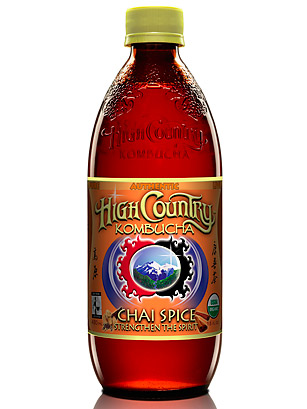
(2 of 2)
According to BevNet in early 2010, Randy Trahan, a Consumer Protection Inspector for the Maine Department of Agriculture, noticed that kombucha bottles were leaking and suspected that alcohol, a byproduct of the fermentation process, was the culprit. Trahan guessed correctly and subsequent tests showed alcohol levels in the kombucha drinks he tested ranged upwards of 2.5% — well above the 0.5% legal limit for non-alcoholic beverages. The positive tests caused Whole Foods and other stores across the country to immediately remove kombucha products from their shelves for fear of violating federal alcohol regulations and facing stiff fines.
High Country products were off store shelves for about six weeks. "At first it was pretty scary," Rothbauer admits. He had no idea whether stores would continue to have an appetite for his alternative beverage even if they were able to assure them of their alcohol content. The media attention on the industry went from non-existent to suffocating in a matter of days. Celebrity tabloids speculated that Linsday Lohan failed a court-ordered alcohol test because of the drink. "It caused such attention to be paid to the industry," Rothbauer says, "But I thought in the long run the alcohol crisis would be a positive for the industry, and I think it's starting to turn that way now."
Rather than snuff out the burgeoning fad, the alcohol controversy introduced the drink to countless customers who would otherwise have never heard of it. It also had the effect of scaring away bigger players who were just starting to dip their toes in the kombucha pool. Honest Tea, which was in the process of being taken over by Coca-Cola, dropped its kombucha product after Whole Foods temporarily removed kombucha from its stores.
But the competition didn't stay away for long. "The crisis occurred in June of 2010, and by 2011 there were 44 kombucha companies on the market. Everyone wanted to get their hat in the ring," says Rothbauer. The heightened profile of kombucha drove demand, but also supply. High Country had a head start on its competitors, however, with established relationships with Whole Foods and other health food stores around the country, as well as fierce loyalty on the part of customers. The company moved quickly to certify that the product met federal standards, and shortened its shelf life to five months to assure that further fermentation wouldn't push the alcohol content above the legal limit.
The disruption in the market didn't leave High Country unscathed. Increased competition slashed revenues in 2011 by 50% to $1.6 million. But aggressive cost cutting and increased outreach through social media and in-store demos have so far made 2012 a banner year for the company. Its monthly figures are setting it on pace for a record year of $5 million in revenue, pushing High Country into profitability for the first time since it built its first factory in 2005.
To reach new markets beyond the uber-health conscious, High Country is fiddling with its recipe, trying to create flavors that will have a broader appeal. Its new flavor line has been in the works for about a year, and the company hopes to launch it sometime this summer. Still, it won't turn its back on traditional kombucha or the faith that its popularity can continue to grow at the rate of the past decade. With a product as unique as kombucha, Rothbauer argues, most conversions come when a trusted friend recommends the product. Says Rothbauer, "Nothing beats word of mouth."